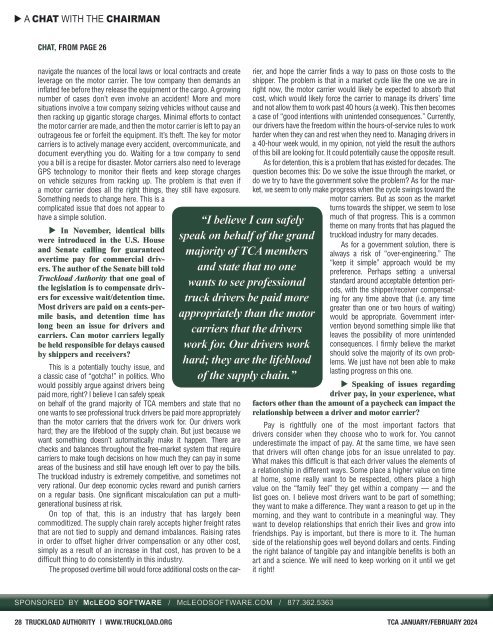TLA64_AllPages
You also want an ePaper? Increase the reach of your titles
YUMPU automatically turns print PDFs into web optimized ePapers that Google loves.
A CHAT WITH THE CHAIRMAN<br />
CHAT, FROM PAGE 26<br />
navigate the nuances of the local laws or local contracts and create<br />
leverage on the motor carrier. The tow company then demands an<br />
inflated fee before they release the equipment or the cargo. A growing<br />
number of cases don’t even involve an accident! More and more<br />
situations involve a tow company seizing vehicles without cause and<br />
then racking up gigantic storage charges. Minimal efforts to contact<br />
the motor carrier are made, and then the motor carrier is left to pay an<br />
outrageous fee or forfeit the equipment. It’s theft. The key for motor<br />
carriers is to actively manage every accident, overcommunicate, and<br />
document everything you do. Waiting for a tow company to send<br />
you a bill is a recipe for disaster. Motor carriers also need to leverage<br />
GPS technology to monitor their fleets and keep storage charges<br />
on vehicle seizures from racking up. The problem is that even if<br />
a motor carrier does all the right things, they still have exposure.<br />
Something needs to change here. This is a<br />
complicated issue that does not appear to<br />
have a simple solution.<br />
u In November, identical bills<br />
were introduced in the U.S. House<br />
and Senate calling for guaranteed<br />
overtime pay for commercial drivers.<br />
The author of the Senate bill told<br />
Truckload Authority that one goal of<br />
the legislation is to compensate drivers<br />
for excessive wait/detention time.<br />
Most drivers are paid on a cents-permile<br />
basis, and detention time has<br />
long been an issue for drivers and<br />
carriers. Can motor carriers legally<br />
be held responsible for delays caused<br />
by shippers and receivers?<br />
“I believe I can safely<br />
speak on behalf of the grand<br />
majority of TCA members<br />
and state that no one<br />
wants to see professional<br />
truck drivers be paid more<br />
appropriately than the motor<br />
carriers that the drivers<br />
work for. Our drivers work<br />
hard; they are the lifeblood<br />
of the supply chain.”<br />
This is a potentially touchy issue, and<br />
a classic case of “gotcha!” in politics. Who<br />
would possibly argue against drivers being<br />
paid more, right? I believe I can safely speak<br />
on behalf of the grand majority of TCA members and state that no<br />
one wants to see professional truck drivers be paid more appropriately<br />
than the motor carriers that the drivers work for. Our drivers work<br />
hard; they are the lifeblood of the supply chain. But just because we<br />
want something doesn’t automatically make it happen. There are<br />
checks and balances throughout the free-market system that require<br />
carriers to make tough decisions on how much they can pay in some<br />
areas of the business and still have enough left over to pay the bills.<br />
The truckload industry is extremely competitive, and sometimes not<br />
very rational. Our deep economic cycles reward and punish carriers<br />
on a regular basis. One significant miscalculation can put a multigenerational<br />
business at risk.<br />
On top of that, this is an industry that has largely been<br />
commoditized. The supply chain rarely accepts higher freight rates<br />
that are not tied to supply and demand imbalances. Raising rates<br />
in order to offset higher driver compensation or any other cost,<br />
simply as a result of an increase in that cost, has proven to be a<br />
difficult thing to do consistently in this industry.<br />
The proposed overtime bill would force additional costs on the carrier,<br />
and hope the carrier finds a way to pass on those costs to the<br />
shipper. The problem is that in a market cycle like the one we are in<br />
right now, the motor carrier would likely be expected to absorb that<br />
cost, which would likely force the carrier to manage its drivers’ time<br />
and not allow them to work past 40 hours (a week). This then becomes<br />
a case of “good intentions with unintended consequences.” Currently,<br />
our drivers have the freedom within the hours-of-service rules to work<br />
harder when they can and rest when they need to. Managing drivers in<br />
a 40-hour week would, in my opinion, not yield the result the authors<br />
of this bill are looking for. It could potentially cause the opposite result.<br />
As for detention, this is a problem that has existed for decades. The<br />
question becomes this: Do we solve the issue through the market, or<br />
do we try to have the government solve the problem? As for the market,<br />
we seem to only make progress when the cycle swings toward the<br />
motor carriers. But as soon as the market<br />
turns towards the shipper, we seem to lose<br />
much of that progress. This is a common<br />
theme on many fronts that has plagued the<br />
truckload industry for many decades.<br />
As for a government solution, there is<br />
always a risk of “over-engineering.” The<br />
“keep it simple” approach would be my<br />
preference. Perhaps setting a universal<br />
standard around acceptable detention periods,<br />
with the shipper/receiver compensating<br />
for any time above that (i.e. any time<br />
greater than one or two hours of waiting)<br />
would be appropriate. Government intervention<br />
beyond something simple like that<br />
leaves the possibility of more unintended<br />
consequences. I firmly believe the market<br />
should solve the majority of its own problems.<br />
We just have not been able to make<br />
lasting progress on this one.<br />
u Speaking of issues regarding<br />
driver pay, in your experience, what<br />
factors other than the amount of a paycheck can impact the<br />
relationship between a driver and motor carrier?<br />
Pay is rightfully one of the most important factors that<br />
drivers consider when they choose who to work for. You cannot<br />
underestimate the impact of pay. At the same time, we have seen<br />
that drivers will often change jobs for an issue unrelated to pay.<br />
What makes this difficult is that each driver values the elements of<br />
a relationship in different ways. Some place a higher value on time<br />
at home, some really want to be respected, others place a high<br />
value on the “family feel” they get within a company — and the<br />
list goes on. I believe most drivers want to be part of something;<br />
they want to make a difference. They want a reason to get up in the<br />
morning, and they want to contribute in a meaningful way. They<br />
want to develop relationships that enrich their lives and grow into<br />
friendships. Pay is important, but there is more to it. The human<br />
side of the relationship goes well beyond dollars and cents. Finding<br />
the right balance of tangible pay and intangible benefits is both an<br />
art and a science. We will need to keep working on it until we get<br />
it right!<br />
Sponsored by Mcleod software / McLeodSoftware.com / 877.362.5363<br />
28 Truckload Authority | www.Truckload.org TCA JANUARY/FEBRUARY 2024

















